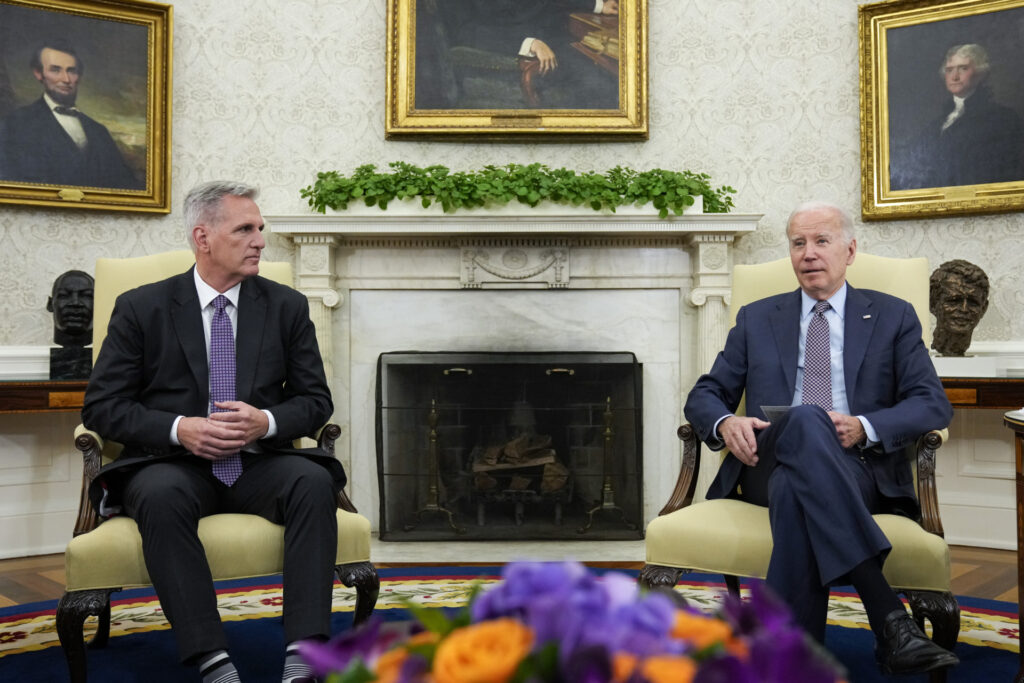
Congress released a bill package Sunday to increase the nation’s debt limit in exchange for a number of Republicans’ desired spending cuts and other concessions.
House lawmakers will have three days to review the 99-page bill, called the Fiscal Responsibility Act, before they are set to vote for it as soon as Wednesday. The bill can be viewed here.
House GOP leadership said in a statement that the legislation, which raises the debt ceiling through January 2025, included a “historic series of wins.”
“The Fiscal Responsibility Act does what is responsible for our children, what is possible in divided government, and what is required by our principles and promises,” the leaders said. “Only because of Republicans’ resolve did we achieve this transformative change to how Washington operates.”
The bill rescinds funds that have been allocated toward COVID, mandates student loan payments to resume in August, rescinds a portion of unused funding allocated toward the IRS, expands work requirements for certain welfare recipients, and tightens permitting processes under the National Environmental Policy Act.
The bill also caps discretionary spending for the next two years and includes a provision pushed by Rep. Thomas Massie (R-KY) to force Congress into funding the government through 12 appropriations bills rather than one omnibus bill.
House Speaker Kevin McCarthy (R-CA) and President Joe Biden came to the agreed-upon legislation after months of stalemate and then days of intense negotiations in the leadup to what Treasury Secretary Janet Yellen has warned could be a June 5 default date.

President Joe Biden meets with House Speaker Kevin McCarthy to discuss the debt limit in the Oval Office of the White House, May 22, 2023, in Washington. (AP Photo/Alex Brandon)
Republican and Democrat leaders must now convince their respective parties in both the House and Senate to pass the bill in the face of concerns or objections from various members on both sides of the political aisle.
“I think it’s a really important step forward. It takes the threat of catastrophic default off the table, protects our hard-earned and historic economic recovery, and the agreement also represents a compromise which means no one got everything they want,” Biden said ahead of the text’s release Sunday.
The president said he “strongly urged” both the House and Senate to pass the bill.
Asked about the months he spent vowing not to compromise on a debt ceiling increase, Biden said, “If you want to try to make it look like I made some compromise of the debt ceiling, I didn’t. I made a compromise on the budget.”
While leaders from both parties begin what is expected to be an intense few days of whipping to round up enough votes for the bill to pass, some Republicans, particularly those in the House Freedom Caucus, are voicing opposition to it.
Reps. Chip Roy (R-TX), Ken Buck (R-CO), Dan Bishop (R-NC), Andrew Clyde (R-GA), and Lauren Boebert (R-CO) are among those saying they plan to vote no on the bill.
“It accepts [the 2022 omnibus bill’s] spending levels!! I mean you can’t make this crap up,” Roy said.
Sen. Rand Paul (R-KY) accused “fake conservatives” of agreeing to “fake spending cuts.”
Their opposition indicates the votes in both chambers will need to be bipartisan to some degree for the bill to pass.
Write to Ashley Oliver at [email protected]. Follow her on Twitter at @asholiver.





